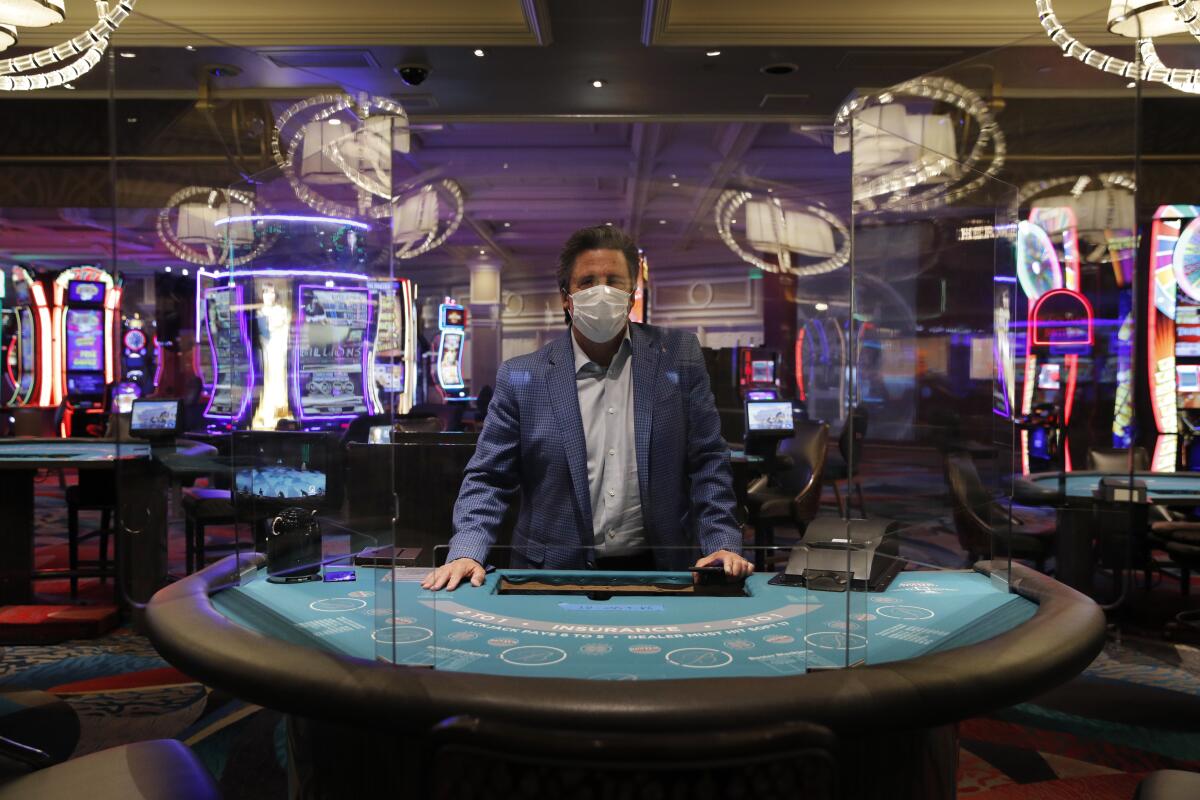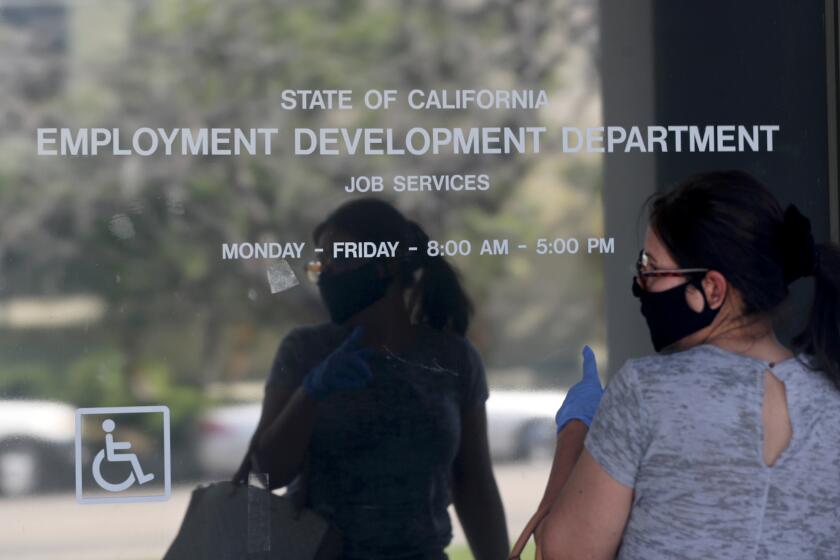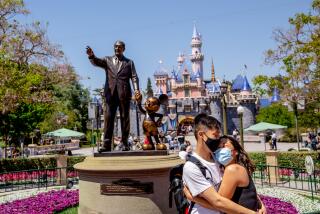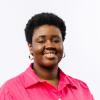As the U.S. death toll hits 100,000, theme parks and casinos prepare to reopen

As the U.S. passes the grim milestone of 100,000 COVID-19 deaths, some of the country’s most popular tourist destinations are planning to reopen in the coming weeks. Theme parks in Florida and casinos in Las Vegas will reopen in June and July, with state and company officials promising “every precaution” and “a safe product.”
A Florida task force on Wednesday approved reopening plans from SeaWorld and Walt Disney World in Orlando. Pending final approval from Gov. Ron DeSantis, SeaWorld will open June 11 and Disney World will reopen the Magic Kingdom and Animal Kingdom on July 11.
DeSantis previously signed off on Universal Orlando’s plan to reopen on June 5.
The parks will introduce new social distancing and cleaning policies, as well as training for employees. Guests and staff will be required to pass temperature screenings before entering the park and wear face coverings. Disney World will also introduce a new ticket reservation system that will require patrons to book in advance.
“People recognize that we live in a different time today,” said Marc Swanson, the interim chief executive of SeaWorld Parks & Entertainment. “We’re anxious to provide a really safe product and optimistic that people will follow the procedures, but we’ll have plenty of signage and plenty of reminders.”
California theme parks, including Disneyland, Universal Hollywood and SeaWorld San Diego, have not yet been given permission to reopen.
In Florida, more than 2,300 people have died from COVID-19, according to the state’s health department. Nationwide, more than 100,000 people have died and about 1.7 million have been confirmed as having the coronavirus, according to Johns Hopkins University.
In Nevada, Gov. Steve Sisolak signed off on the reopening of casinos on the Las Vegas Strip starting June 4. He spoke to reporters on a telephone conference while self-isolating at home after possible exposure to the coronavirus.
“We’ve taken every precaution possible,” Sisolak said Tuesday. “I don’t think you’re going to find a safer place to come than Las Vegas.”
Shut down by the coronavirus, casinos get the go-ahead to start business again with social distancing in place.
The reopenings come as state and local governments attempt to balance public health concerns with the desire to restart their economies, particularly those fueled by tourist dollars. Unemployment in Nevada hit 28% in April, outpacing every other state and every jobless count in Nevada’s history, according to state officials. The state lost 41% of its accommodation and food service jobs compared with April 2019.
Governors across the country have pushed Congress to use the next coronavirus relief bill to send aid to states that have lost billions of dollars in revenue due to closures aimed at stopping the spread of the disease.
New York Gov. Andrew Cuomo said Wednesday that, although states are responsible for reopening timetables, testing, tracing, their healthcare systems and enforcement, “the federal government has a role to play, and the federal government has to do its part.”
Cuomo held his daily news briefing at the National Press Club in Washington after meeting with President Trump at the White House. The governor said his discussion with the president wasn’t about politics, but about how to “supercharge” the reopening of New York and make progress on major infrastructure goals.
He called on Congress to use the next stimulus bill to fund state and local governments, which face steep revenue losses due to the pandemic.
“Do you really want to cut schools now?” he said at his briefing. “Do you really think we should starve state governments and cut hospitals? Would that be smart?”
Cuomo criticized lawmakers and pundits who have referred to the potential funding as a “blue state bailout,” calling it an “un-American” and “ugly sentiment” that contradicts the disproportionate amount of money blue states send to the federal government.
At a news conference Thursday to present a revised state budget for the fiscal year starting July 1, Newsom said the state will need $43.8 billion to cover unemployment claims fueled by the coronavirus crisis in the new year, a 650% increase over what was originally proposed.
“My point to our friends in the Congress: Stop abusing New York, stop abusing New Jersey,” he said. “Stop abusing the states who bore the brunt of the COVID virus through no fault of their own.”
Democratic congressional districts have been hit harder by the coronavirus than Republican districts, according to an analysis released Tuesday by the Pew Research Center. The report found that, of the 92,000 COVID-19 deaths in the U.S. through May 20, nearly 75,000 were in Democratic districts. Democrats represent 41 of the 44 congressional districts with the most deaths.
More than 29,300 New York residents have died of COVID-19 as of Wednesday, according to Johns Hopkins University. Cuomo said the state reported 74 new deaths on Tuesday, a slight increase from Monday’s pandemic low of 73 deaths.
New York City Mayor Bill de Blasio also called for more help for local governments Wednesday morning. He said the coronavirus outbreak had cost the city $9 billion in lost revenue.
“While they’re not acting in the Senate, while the president remains silent, our fiscal situation has gotten worse,” De Blasio said at a news briefing.
Many states and the District of Columbia have also clashed with the Trump administration over when they’ll reopen. Congressional Democrats from the area surrounding the district wrote to the president this week asking him to cancel his plans for a July 4 celebration there. D.C. Mayor Muriel Bowser said this week that no permits for Fourth of July parades will be granted.
Bowser announced Wednesday that the district will, however, move into Phase 1 of reopening on Friday. This will allow for the loosening of restrictions on nonessential retail businesses, barbershops and salons, and certain parks. Restaurants with outdoor seating will be allowed to serve patrons at tables six feet apart.
“The bottom line we do want to emphasize is this virus is still in our city and our region and our country,” Bowser said.
Dr. Anthony Fauci, director of the National Institute of Allergy and Infectious Diseases, said states should be cautious as they reopen, and that new spikes in cases won’t be evident right away.
“The effect of spreading is not going to be seen for two, three and maybe even more weeks,” Fauci said during an interview on CNN Wednesday. Fauci encouraged Americans to continue taking precautions, including wearing masks.
The debate over masks set off a recent back-and -orth between Trump and his likely opponent in the November general election, former Vice President Joe Biden. Trump retweeted a post from Fox News analyst Brit Hume that appeared to make light of a photo of Biden wearing a mask during a public appearance on Memorial Day. The president, who generally declined to wear masks in public, said Tuesday that he wasn’t mocking Biden but thought his decision to wear a mask was “unusual.”
Biden said Tuesday that wearing a mask projects leadership and that Trump was “an absolute fool” for discouraging mask usage. “It’s costing people’s lives,” he said during an interview with CNN’s Dana Bash.
Fauci also expressed optimism that a coronavirus vaccine could be available for distribution by the end of 2020.
“I still think that we have a good chance, if all the things fall in the right place, that we might have a vaccine that would be deployable by the end of the year, by December and November,” Fauci said Wednesday.
Once a vaccine is available, the next challenge for officials may be encouraging the majority of Americans to take it. Fauci emphasized that accelerated vaccine development isn’t happening at the expense of safety, but a new Associated Press-NORC survey released Wednesday found that 20% of those polled do not plan to get vaccinated.
The survey, which was conducted May 14-18, found that 49% of Americans would get vaccinated and 31% aren’t sure.
The Associated Press contributed to this report.
More to Read
Start your day right
Sign up for Essential California for news, features and recommendations from the L.A. Times and beyond in your inbox six days a week.
You may occasionally receive promotional content from the Los Angeles Times.








